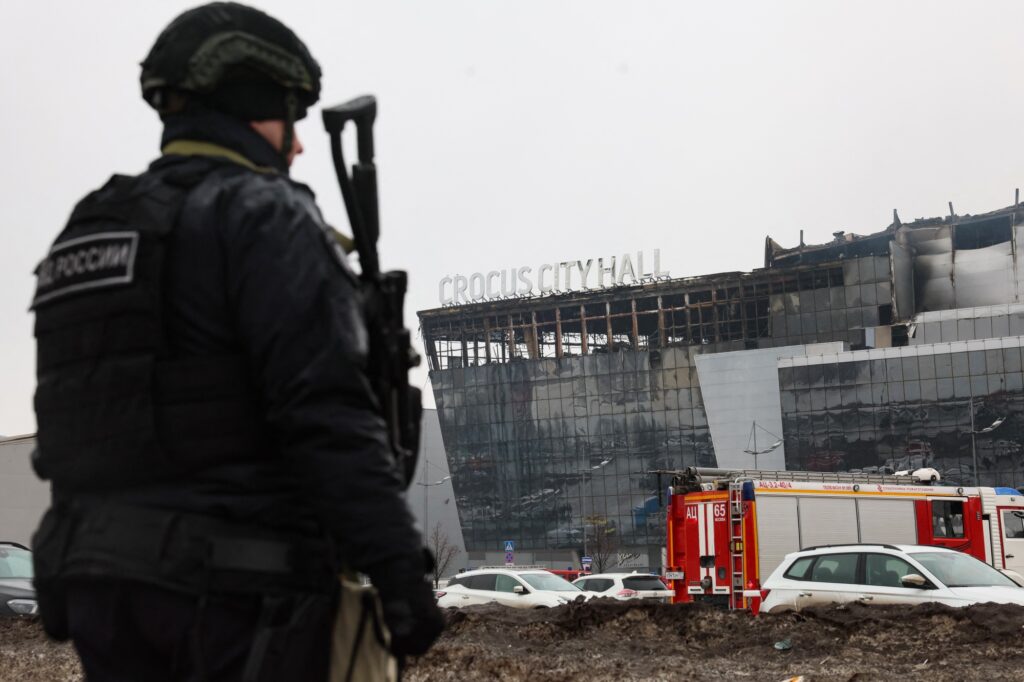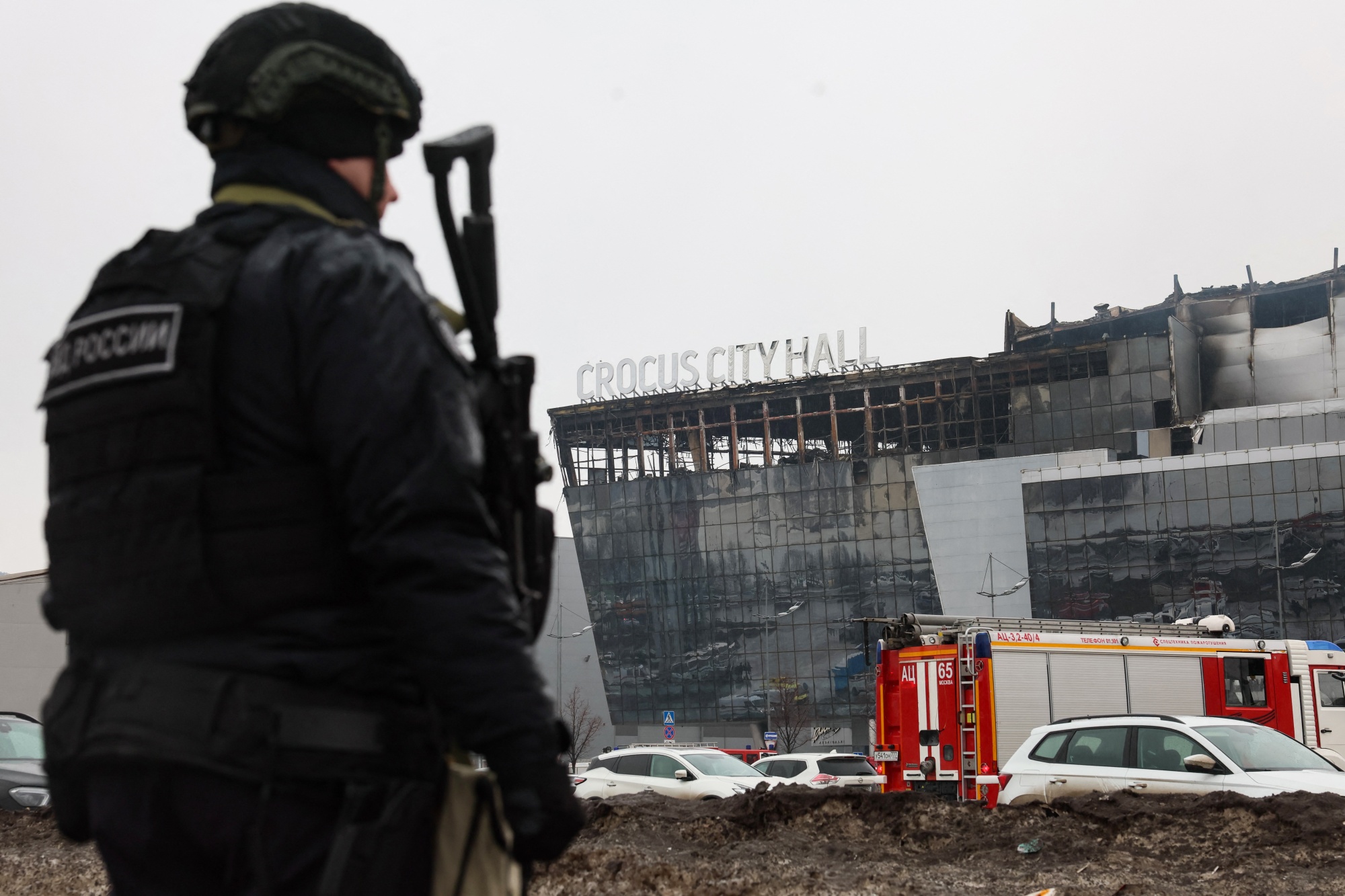
Dr. Naveed Elahi
Over 133 individuals lost their lives, more than one hundred sustained injuries, during a horrifying attack at Crocus City Hall in the Krasnogorsk area near Moscow, where gunmen targeted concert attendees and put the venue to torch. This incident is among the most tragic attacks Russia has faced in last twenty years. The Islamic State Khorasan Province (ISKP), a local variant of Daesh in Afghanistan, has acknowledged carrying out this heinous act. In response, Russian President Vladimir Putin, in a national broadcast, vehemently condemned the attack as a “barbaric terrorist act” and has announced a national day of mourning to honor the victims on 24th March.
The Russian authorities and some other sources have pointed fingers towards Ukraine for facilitating the attack. Nevertheless, Ukraine has vehemently denied its involvement in it. Taliban government of Afghanistan is strangely silent over it. It reveals a complex landscape of international terrorism, proxy wars, and geopolitical maneuvers. Besides, it has created suspicions, mistrust and doubts among the neighbouring countries which can result in an increase in tensions and a dent in harmony in the region.
Internationally, it underscores the complexity of international relations and the use of non-state actors in furthering geopolitical aims. Especially, the assertion that ISKP/Daesh operates as a proxy for certain state interests, specifically mentioned are the United States and Israel, highlights the convoluted nature of modern conflicts where lines between direct and indirect warfare are blurred. The attack could indeed exacerbate tensions between Russia and the countries perceived to be indirectly involved.
ISKP has no direct interest in Russia. Why would it harm it? It is not a good reason, as speculated by a few experts, that Russian involvement in Syria has earned the wrath of ISKP. Putin is not convinced of this reason and holds Ukraine as the prime suspect. Some proponents of this idea are of the view that Ukraine, lacking the means to directly match Russia’s military might, could theoretically consider leveraging non-state actors or proxies as a means to impose costs on Russia indirectly. The devastating Russia-Ukraine war has claimed, as per the report of UN Human Rights Monitoring Mission in Ukraine, 30,457 civilian lives since 24 February 2022. This comprised 10,582 killed and 19,875 injured. Ukraine has not been able to inflict the same sort of harm to Russia. There is a probability that proxy has been used to avenge the civilian losses.
While the idea of avenging civilian losses through proxies might hold some appeal in theory, in practice, it introduces a host of moral, strategic, and operational dilemmas that could exacerbate the conflict and lead to further unintended consequences. Moreover, the US, and the UN Security Council have condemned “in the strongest terms the heinous and cowardly terrorist attack” at Crocus City Hall in Moscow’s northern suburb of Krasnogorsk. The US claims to have informed the Russian authorities of the likelihood of such an attack.
The expansion of the Islamic State Khorasan Province’s (ISKP) activities into Russia raises alarm not just for Russia but also for neighboring countries, notably Pakistan. The presence and activities of Tehreek-e-Taliban Pakistan (TTP), particularly its known connections with ISKP, underscore a looming threat that Pakistan has been facing, exacerbated by the intricate geopolitical and security dynamics of the region. The first chief of ISKP, Hafiz Saeed hailed from Orakzai agency and was ex-TTP. The two terrorist groups keep using their militants for each other’s tasks.
The TTP, operating primarily from Afghanistan, has been a persistent source of violence and instability in Pakistan. Over the last two years, the group has been responsible for numerous attacks, significantly impacting both military personnel and civilians. The relationship between ISKP and TTP further complicates the security landscape, with both groups reportedly sharing resources, including trained militants. This collaboration between jihadist organizations points to a broader network of terrorist factions operating with a degree of interoperability across national borders.
The historical context of the TTP’s formation and its ideological and operational ties with the Afghan Taliban provide insight into the challenges faced by Pakistan in addressing this threat. Despite Pakistan’s repeated appeals to the Afghan Taliban to curb TTP activities, there has been little action taken against the group. The leniency towards the TTP can be partially attributed to the shared sympathies between the TTP fighters and the Afghan Taliban, particularly during the years of resistance against the US invasion.
This scenario presents several key challenges for Pakistan’s national security:
- Cross-Border Terrorism: The porous border between Pakistan and Afghanistan facilitates the movement of militants, making it difficult for Pakistan to secure its frontier against incursions by groups like the TTP and ISKP. Afghan Taliban government has not been able to control them.
- Afghan Taliban’s Stance: The ambiguous position of the Afghan Taliban regarding the TTP complicates diplomatic and security efforts. The sympathies some Taliban leaders hold for TTP fighters, owing to their joint struggles in the past, hinder a unified approach against terrorism. Though ISKP is a clear rival of Afghan Taliban, TTP keeps close relations with it. Afghan Taliban ought to take stern action against these groups.
- Regional Security Dynamics: The outreach of ISKP into Russia, potentially with links to TTP, signifies a broadening scope of jihadist ambitions and capabilities, posing a risk not only to national security but also to regional stability. China must be feeling threatened of this rising threat.
- Regional Collaboration: The transnational nature of the threat underscores the need for enhanced international cooperation, especially in the realm of intelligence and counter-terrorism endeavours. Pakistan must work closely with Russia, and other affected states to devise and implement strategies to counter the spread and influence of terrorist organizations like ISKP and TTP. The author is the editor of The Strategic Brief





Very Sad